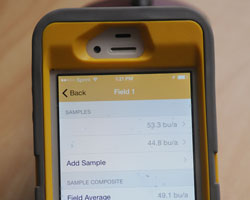By James Schmidt
While a great many who live in the city experience a speedy Internet, some of those living in more rural areas of the United States do not experience the same luxury. Slow Internet speeds in less populated regions can prove troublesome for those working in agricultural fields.
“Internet connectivity is what I would consider an enabling technology,” said Terry Griffin, assistant professor of agricultural economics at Kansas State University. “Without it, precision ag devices and other special technologies cannot be fully utilized until this infrastructure for wireless connectivity has been completed.”
With the abundance of technology in today’s society, it’s more important than ever for agricultural producers to use those resources that are available. Unfortunately, the lack of Internet connectivity sometimes hinders opportunities.
 Slow upload speeds
Slow upload speeds
One technology in particular that hasn’t been utilized to its full potential due to slow Internet connectivity is telematics, which include GPS and other navigation systems.
“Twenty percent of service providers, ag retailers, cooperatives and other input suppliers are using telematics as of 2015, which is up from 2013 when it was 15 percent,” said Griffin, a cropping systems specialist for K-State Research and Extension. “The point is, the adoption of telematics is increasing at a steady rate, but still a pretty small percentage of service providers use the potential of that technology.”
However, even in areas with a sufficient Internet connection, another problem arises, Griffin said. Internet providers are focused much more on download speeds, rather than upload speeds.
“The problem with that for agriculture is we tend to want to upload data from fields that we generate from our farming equipment rather than download,” he said.
While traveling, Griffin said he is able to keep track of Internet speeds at different locations through his phone. He’s found that in general, download speeds are about three times faster than upload speeds.
Even with slow Internet speeds, it’s possible to collect data, although the process may be inconvenient.
“Transferring data is still possible, it just may not be in real time as the data in the fields are collected,” Griffin said. “There is opportunity to move data after the fact, which is going to be the status quo for a little while. There is pressure from farms that the cellular connectivity providers can see the need to improve their services.”
Legislators in some states have felt such pressure from constituents in rural areas and are starting to make a push. Griffin said several states have developed or are developing legislation based on improving Internet speeds in rural areas.
While legislators may try to improve the Internet through legislation, Griffin believes that the Internet will improve over time when the need for it is experienced.
“Internet connectivity is improving all the time,” Griffin said. “I think it will improve through natural business processes from the wireless carriers when they see there is a need for agricultural and construction uses of data transfer in rural areas.”
It’s also important to note the type of Internet connection, wired or wireless, that is put into rural areas.
“A lot of times that rural Internet may be wired, which is important,” he said. “But when we’re talking about telematics with respect to agricultural data, we’re talking about wireless, because we’re trying to move data from farm equipment in real time.”
While slow Internet speeds currently hinder some farmers and others in rural areas, the future does look bright for the implementation of more technology in these fields.
“In the future it will be solved,” Griffin said. “I’m not sure when the future will be, but it will continue to get better.”
Source:k-state.edu